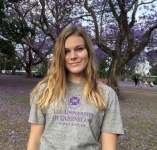

Abigail Turnlund
acturnlundold@gmail.com
PhD
School of Chemistry and Molecular Bioscience

Abigail Turnlund
acturnlundold@gmail.com
PhD
School of Chemistry and Molecular Bioscience
Microbial Inducers for Coral Larval Settlement
Abigail grew up in the Bay Area, California and was inspired to becoming a marine biologist after spending so much time at the Monterey Bay Aquarium. During high school she worked as an aquarium docent at the Seymour Marine Discovery Center at UC Santa Cruz and learned how important science communication is for the marine sciences.
Abigail received her Bachelors of Science at San Diego State University and completed her Undergraduate Honor's Thesis under the supervision of Dr. Elizabeth Dinsdale. During her time there she helped characterize the skin microbiome of whale sharks, leopard sharks, various rays, and characterized kelp forest microbial communities from all around San Diego and La Jolla . For her PhD she switched to coral reef science and joined Dr. Nicole Webster's lab to elucidate coral larval settlement and microbial biofilm interactions using network analysis at the University of Queensland in 2020.
Microbial Inducers for Coral Larval Settlement
2020 to 2023
Project Description
This project aims to identify microorganisms involved in inducing/inhibiting settlement and metamorphosis of coral larvae and attempt to cultivate inductive taxa to produce a broad-spectrum larval settlement cue for use in coral aquaculture.
Project Importance
Identifying and understanding the cues that trigger effective and reliable settlement of coral larvae across a diverse range of species is crucial for reef restoration initiatives. While it is well-established that crustose coralline algae (CCA) play a significant role in the induction of larval settlement for Acroporid corals, this is not always the case for other coral genera, and in some instances microbial biofilms alone can trigger settlement without the presence of CCA. However, little is known about the complex microbial interactions required to provide a suitable coral settlement environment. While coral larvae can differentiate between bioflm characterisitcs including bacterial density, biochemical signals and community composition, it is still unknown which specific microbial taxa, genes or pathways are responsible for producing these settlement cues.
Project Methods
This project uses 16S & 18S amplicon sequencing and metagenomics data gathered from a larval choice experiment that analyzed coral larval settlement on microbial biofilms developed under different environmental conditions. Co-occurrence network and modularity analysis is used to identify microbial communities and functions that are exclusive to different levels of larval settlement.
Project Results
This project will identify key microbes or microbial functions that will reliably induce and underpinning coral larval settlement.
Keywords
Bacteria,
Biodiscovery,
Climate change,
Coral reefs,
Corals,
Ecology,
Microbial,
Microbiology,
Molecular techniques
Supervised By:
Inka Vanwonterghem (University of Queensland)
Miguel Lurgi (Swansea University)
Paul O'Brien (University of Queensland)